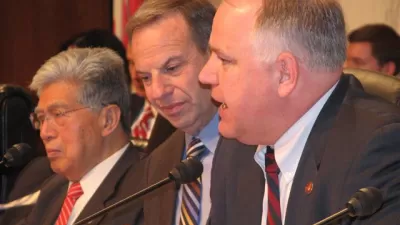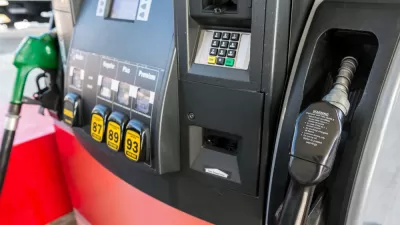The incoming chair of the House Transportation and Infrastructure Committee, Peter DeFazio (D-Ore.), points to gubernatorial races and a California ballot initiative to show there's no peril for legislators to hike the gas tax.

"Rep. Peter DeFazio, an Oregon Democrat expected to head the committee when his party takes over the House of Representatives in January, told MarketWatch that this month’s midterm elections showed raising [state] gasoline taxes isn’t a political third rail, and that it’s 'something we can work on' with President Donald Trump as Washington tries to fashion an infrastructure package," reports Robert Schroeder.
Infrastructure is back in the spotlight after the midterms, with Democrats, Trump and Republican leaders all expressing interest. But paying for improvements and new projects will be the “hangup,” according to incoming House Minority Leader Kevin McCarthy, a California Republican.
But this last election demonstrated there’s no “political peril” for lawmakers who would raise the gasoline tax if they show voters it will improve roads and bridges, [DeFazio] said in a lightly edited interview with MarketWatch about his ideas.
First question: How do you propose to pay for instructure investment?
DeFazio points to the "three bipartisan infrastructure proposals" listed on his "Investing in America" webpage, the first one being "A Penny For Progress (H.R. 1664)."
Rather than increasing the 18.4 cent federal gas tax and 24.4 cent diesel tax, unchanged since 1993 when it was increased by 4.3 cents per gallon, the bill takes an extremely modest approach by indexing the gas and diesel tax to highway construction costs and reduced fuel usage due to Corporate Average Fuel Economy (CAFE) standards, i.e., fuel efficiency standards. It hasn't moved since being introduced in March 2017, but it wasn't his first attempt at it either.
DeFazio introduced an earlier version of the bill in March 2013 where it also languished under the Obama administration that was not receptive to increasing the gas tax.
Second question: "To be clear, you believe the president would still be on board with some form of a gasoline tax?"
DeFazio expressed optimism that an agreement could be reached with the Trump administration.
The president, in my one meeting with him, advocated a substantial gas-tax increase, so I think this is still something we can work on, and we’re going to need the president, because there’s a reluctance on the part of some in the Senate.
However, it was DeFazio's analysis of how gas taxes fared in the midterms that was the most illuminating part of the interview.
In California, [incoming House] Minority Leader [Kevin] McCarthy used personal campaign funds to put on a ballot measure [Proposition 6] to repeal their gas tax and fee increase, and he got his head handed to him, in more ways than one, and it pretty well p’d off a lot of groups that are traditionally supporting Republicans — [the Associated General Contractors of America (AGC)] and others.
And then Tim Walz, my colleague, ran for governor of Minnesota and advocated a 10-cent gas increase. Next door, Michigan, a woman [Gov.-elect Gretchen Whitmer] — both red to blue states — advocated, she said, “Fix the damn roads.” [See: Minnesota Gubernatorial Candidate Campaigned on Increasing the Gas Tax and Wins].

Study: Maui’s Plan to Convert Vacation Rentals to Long-Term Housing Could Cause Nearly $1 Billion Economic Loss
The plan would reduce visitor accommodation by 25,% resulting in 1,900 jobs lost.

Alabama: Trump Terminates Settlements for Black Communities Harmed By Raw Sewage
Trump deemed the landmark civil rights agreement “illegal DEI and environmental justice policy.”

North Texas Transit Leaders Tout Benefits of TOD for Growing Region
At a summit focused on transit-oriented development, policymakers discussed how North Texas’ expanded light rail system can serve as a tool for economic growth.

Nevada Bills Aim to Establish Home Insurance Assurance Amidst Wildfire Risk
Republican sponsor hopes the FAIR plan would be “a true market of last resort.”

Virginia Law Allows Judges to Mandate Speed Limiters
The law could set a new precedent for speed limiting tech on U.S. vehicles.

Comment: EPA Cuts will Send Atlanta Back to Eye-burning Ozone, Lung-damaging Smog, and Raw Sewage in the Chattahoochee River
A veteran political journalist takes stock of the hard-earned ground Georgia stands to lose with slashed environmental protection.
Urban Design for Planners 1: Software Tools
This six-course series explores essential urban design concepts using open source software and equips planners with the tools they need to participate fully in the urban design process.
Planning for Universal Design
Learn the tools for implementing Universal Design in planning regulations.
City of Santa Clarita
Ascent Environmental
Institute for Housing and Urban Development Studies (IHS)
City of Grandview
Harvard GSD Executive Education
Toledo-Lucas County Plan Commissions
Salt Lake City
NYU Wagner Graduate School of Public Service




























